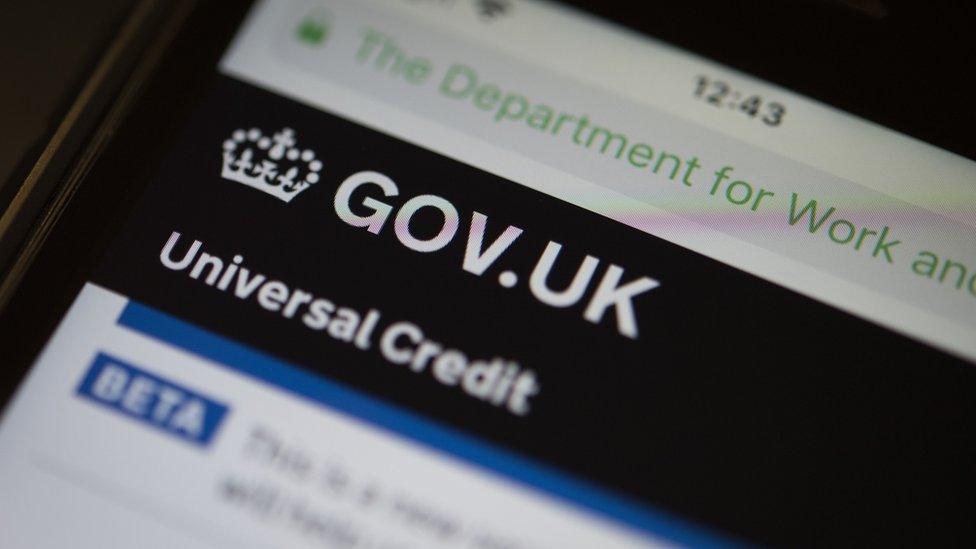Universal Credit failing millions of people, say peers
- Published

Universal Credit is "failing millions of people", especially the vulnerable, according to a new report from peers.
The Lords' Economic Affairs Committee said it agreed with the government's aim for the scheme - to bring together multiple benefits into one payment.
But it criticised its design, blaming Universal Credit for "soaring rent arrears and the use of food banks".
Welfare delivery minister Will Quince said the government was "committed to supporting the most vulnerable".
But he said the scheme had "defied its critics in unprecedented and unforeseeable circumstances" during the coronavirus pandemic, adding: "The case for Universal Credit has never been stronger."
One poverty charity, the Joseph Rowntree Foundation, said the report "reinforced the scale and urgency of reforms needed".
And Labour said the system was "simply not working", instead "pushing people further into poverty and debt".
The Lords' report said cuts to social security budgets over the last 10 years had caused "widespread poverty and hardship".
As a result, the committee said Universal Credit needed "urgent investment just to catch up and provide claimants with adequate income".
The peers called on the government to make the rise in payments due to the coronavirus crisis permanent.
They also called for a non-repayable two-week grant to be introduced to cut the current five-week wait for a claimant's first payment.
The government said urgent payments were already available, but peers said the standard five weeks "entrenches debt, increases extreme poverty and harms vulnerable groups disproportionately".

'You can't do anything but worry about survival'

Beth - who has asked for her real name to remain confidential - signed up to Universal Credit in March after the coronavirus outbreak.
"I had started a role a few weeks before lockdown, but I was told on the first day that the project was going to shut down," said the 31-year-old freelancer from London.
"I was then told I would be unlikely to find work in my field before August and I wasn't eligible for furlough because of my start date, so, for only the second time... I signed up for benefits."
Beth found the online process quite fast and managed to get ahead of the backlog, but it took almost six weeks for her first payment, and the amount changed from month to month, leaving her struggling to make ends meet.
"The people running it don't know how PAYE freelancers or zero hour contracts work," she said. "They send constant demands to apply for work and at the start of lockdown I was being told to apply for places that weren't even hiring.
"No-one picks up on the phone line and then when they finally do, they tell you they can't help. And the payment itself is for rent, and then under £100 a week for all bills, transport and food."
Beth said her "whole life was overturned" and the stress caused her to suffer with very severe depression, which she is still struggling with now she is back in employment.
"They expect us to focus on job applications and interviews, but you can't do anything but worry about survival," she said.
"I'm just glad I have no dependents as I have single mother colleagues who are going through the same thing, after never signing on before."

The committee also criticised the way payments were calculated, claiming the system could result in "large fluctuations in income month-to-month, making it extremely difficult for claimants to budget".
It wants payments to be fixed for three months and for historic tax credit debt to be written off.
Tory peer Lord Forsyth, who chairs the committee, said the system "fails to provide a dependable safety net" for those in need.
"The mechanics of Universal Credit do not reflect the reality of people's lives," he added. "It is designed around an idealised claimant and rigid, inflexible features of the system are harming a range of claimant groups, including women, disabled people and the vulnerable.
"It needs rebalancing, with more carrot and less stick, particularly as large numbers of claimants will have ended up on it because of events completely out of their control. "
Universal Credit was introduced by the coalition government in 2010 to replace six benefits with one payment.
But it has led to a number of controversies, including cuts to the amount people receive, delays in payments and questions over assessments.
'Extra help given'
Mr Quince said the government currently spends over £95bn a year on the benefits system and has put in an extra £9.3bn to help "those most in need" during the current crisis.
He said the system had processed more than 3.2m new claims "at pace" since mid-March and was "paying more than a million advances worth hundreds of millions of pounds to those in urgent need within days".
The minister added: "We welcome the acknowledgement by the Committee that Universal Credit is here to stay and we will consider their recommendations in detail."
- Published13 May 2024
